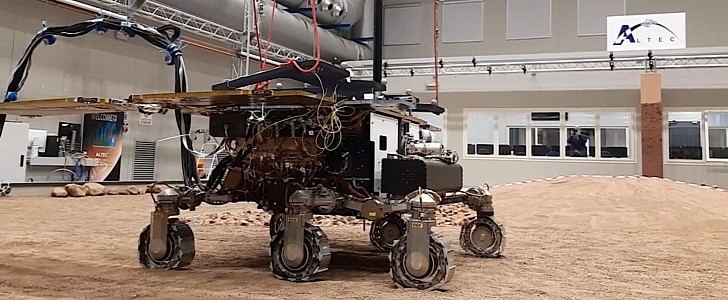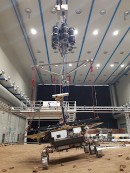It’s common knowledge that bringing objects and beings into an area that has been isolated for a long time can have devastating consequences. Just to give an example, take the native American communities, for instance, that were hit hard by the Europeans that reached their shores with unknown diseases in tow.
Now, our planet is pretty much colonized, so the only places left for us to contaminate are elsewhere in the solar system. Sure, there is no life that we know of on the rocks that surround us, but contamination is a devil with many faces, and the introduction of the smallest of organic particles could have significant impact even on the deadest of environments.
This is why everything we humans send to other worlds is built-in so-called clean rooms, and subjected to various procedures meant to eliminate biological hazards.
The latest machine to go through such a process is the Rosalind Franklin, the European-made rover of the ExoMars mission. As you can see in the video below, it was just taken out of a huge oven last week, all tidy and clean.
The massive cylinder that housed it for 120 hours is in fact a vacuum chamber heated to 35 degrees Celsius (95 degrees Fahrenheit). As per the scientists working on the rover, although that temperature might not seem like much, it is enough “to sublimate hidden contaminants generated by the off-gassing of some of the rover’s internal parts, such as small bits of glue.“
It’s extremely important to send the rover over to Mars with no biological luggage as its main mission is to search for signs of life on the neighboring planet. Cameras, sensors, and even an onboard laboratory have been fitted on the rover to aid it in its quest.
The European mission to Mars is scheduled for departure sometime in the fall of next year, during which time the machine will have to be decontaminated some more.
This is why everything we humans send to other worlds is built-in so-called clean rooms, and subjected to various procedures meant to eliminate biological hazards.
The latest machine to go through such a process is the Rosalind Franklin, the European-made rover of the ExoMars mission. As you can see in the video below, it was just taken out of a huge oven last week, all tidy and clean.
The massive cylinder that housed it for 120 hours is in fact a vacuum chamber heated to 35 degrees Celsius (95 degrees Fahrenheit). As per the scientists working on the rover, although that temperature might not seem like much, it is enough “to sublimate hidden contaminants generated by the off-gassing of some of the rover’s internal parts, such as small bits of glue.“
It’s extremely important to send the rover over to Mars with no biological luggage as its main mission is to search for signs of life on the neighboring planet. Cameras, sensors, and even an onboard laboratory have been fitted on the rover to aid it in its quest.
The European mission to Mars is scheduled for departure sometime in the fall of next year, during which time the machine will have to be decontaminated some more.












